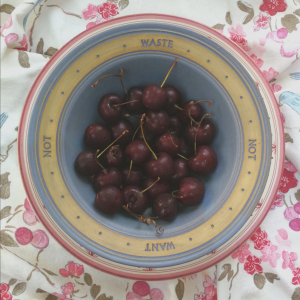Taste or Waste? (first published in West Sussex County Times)

I recently listened to a Sustainable Squad podcast (Listen to this episode now on @spotify and @applepodcasts) with Shane Jordan, who became a chef by chance because of his involvement with Food Cycle, collecting unwanted food from shops by bicycle then taking it to be cooked at a Sussex community centre. In his book, Food Waste Philosophy, he explains that he uses every edible part of plants in his cooking, including banana skins.
I was struck with his passion and ingenuity. Another inspirational example is Horsham chef Lenny Salsano, who works at Hill Top Primary School in Crawley. Pre-pandemic, he engaged the pupils in planting, growing and cooking the food used in their lunches. Lenny is keen for the children to learn how important it is to eat fresh, unprocessed food, and shares his skills with pupils. This year they have made salads, chopped vegetables and watched him make bread, which they then eat. Five other schools under the Caterlink umbrella are now using Lenny’s model.
In contrast, Dr Jennie Parnham of the School of Public Health at Imperial College, London, says, “We need urgent policy to cap the levels of ultra-processed food in school meals which consist mostly of ultra-processed foods, high in sugar, fat, salt and other additives linked to obesity and cancer.”
At a visit I made last week to WSCC’s Waste Facility at Warnham, I learned that, shockingly, our biggest problem by far is food waste, making up 40% of our ‘rubbish’. Not only is money wasted on food that’s not eaten, but taxpayers pay a second time to have it taken away from their homes! (Biffa charges WSCC £27 per tonne, and the government charges £97 on top.) There is now no space left in West Sussex landfill so permission has been granted for an incinerator to run as a private enterprise by Britannia Crest.
With a huge warehouse proposed at Southwater and this incinerator at Warnham, our wasteful consumerism is leading to more traffic, air pollution and global warming; so increased droughts and floods make it harder to grow food and cause erosion of soil. And that’s the bottom line, because all life depends on plants. So let’s reduce the amount of food we buy, plan meals and use every part of the plant.
UK food waste is the highest in Europe, so we need to come to our senses, literally, using our eyes and nose to see if food is edible, rather than relying on a number. Thankfully it is now a law that supermarkets must donate unsold food and Horsham Community Fridge is available 10am-11am at the next Sussex Green Hub on Saturday 27th August, United Reformed Church, Springfield Road (behind Wilkos).
PS I tried it, and chopped banana skins are great in hearty stews.
By Morag Warrack




